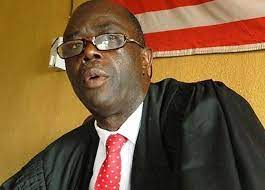The nomination of Associate Justice Yamie QuiQui Gbeisay to the position of Chief Justice of Liberia has sparked intense scrutiny, particularly regarding his ability to unite the Supreme Court bench. President Joseph N. Boakai’s selection of Justice Gbeisay, the third least senior justice, has raised eyebrows within the legal community, given that more senior justices, such as Jamesetta Howard-Wolokollie and Yussif Kaba, were bypassed. The Senate Judiciary Committee, tasked with vetting Gbeisay’s nomination, has pressed him to articulate his strategy for maintaining unity and cohesion within the court. This line of questioning stems from the inherent challenges of leading a body where seniority and experience are highly valued, and where the Chief Justice’s authority must be balanced with the independence of the other justices.
Justice Gbeisay’s confirmation hearing before the Senate Judiciary Committee has been marked by his apparent difficulty in outlining a concrete plan to address the concerns regarding bench unity. While acknowledging the importance of a unified court, he has largely relied on his personal relationships with his fellow justices, particularly Justice Kaba, a former law school classmate, as evidence of his ability to foster collegiality. He has emphasized the shared legal background and years of professional interaction among the justices, suggesting that these pre-existing bonds will suffice to ensure smooth collaboration. However, this informal approach has seemingly failed to fully convince the senators, who are seeking more substantive assurances and a clearer vision for leadership.
Senator Augustine Chea, Chair of the Judiciary Committee, has underscored the need for Justice Gbeisay to provide a more comprehensive and persuasive explanation of his leadership philosophy. He has emphasized that each senator requires reassurance that Gbeisay possesses the necessary skills to not only manage the court effectively but also to prevent dissenting opinions from fracturing its unity. The senator’s insistence on a detailed plan highlights the critical role of the Chief Justice in maintaining the court’s integrity and public trust, especially given the potential for internal divisions to undermine its authority.
In response to the Senate’s concerns, Justice Gbeisay has pointed to the presence of Associate Justices Kaba and Clinton-Johnson at his confirmation hearing as a demonstration of their support for his nomination. He has argued that their attendance signifies their confidence in his leadership and willingness to work collaboratively under his guidance. Furthermore, he has emphasized that his appointment from within the existing bench, rather than from outside the court, should further contribute to a harmonious working relationship with his colleagues. However, this argument remains predicated on personal relationships and assumptions of goodwill, rather than a clearly articulated strategy for managing potential disagreements or conflicts.
Beyond the issue of bench unity, Justice Gbeisay has presented his broader vision for the Liberian judiciary. He has highlighted his extensive legal experience, spanning over two decades in various capacities, including private practice, judgeship, and his current role as an Associate Justice. He has pledged to pursue legal reforms in consultation with the legislature and to prioritize capacity-building initiatives for magistrates and justices. He has also emphasized his commitment to upholding the rule of law and interpreting the constitution without fear or favor, referencing his track record of presiding over landmark cases, some of which have generated controversy.
In his concluding remarks, Justice Gbeisay has expressed confidence that the Senate will ultimately confirm his nomination, reiterating his commitment to serving the judiciary with integrity and to justifying the trust placed in him by the President and the legislature. He has submitted his curriculum vitae, highlighting his qualifications and experience, and has expressed hope that the senators will objectively evaluate his credentials and recognize his suitability for the position of Chief Justice. The Senate’s decision will ultimately determine whether Gbeisay’s assurances and vision for the judiciary are sufficient to overcome concerns about his ability to unite the Supreme Court bench and effectively lead the nation’s highest court.


